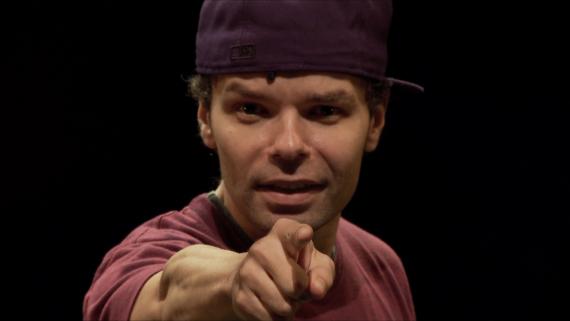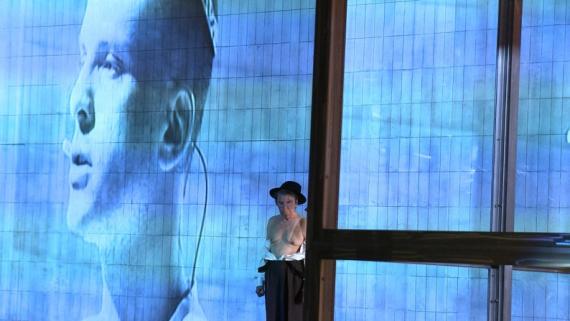Creativity finds many outlets, but stems from a common source: unimpeachable self-belief, such as to allow one conceive that they have something worth sharing with the wider world: something so different, so inventive, so new, as to compel others to pay attention to them. Exposing oneself thus comes with risks attached, of course. Believing that one has something important to say about the world is not quite the same thing as actually having something important to say. But as three very different documentaries to be screened at EPOS, the International Art Film Festival suggest, some risks are worth taking. For oneself and for the others.
Krzysztof Warlikowski, or the Legacy of Sacrifice is intriguing portrait of the eponymous Polish theatre director at work. Directed by Manuelle Blanc, the documentary follows rehearsals for his production, (A)pollonia. Warlikowski works within the canon of western theatre but does not perceive himself bound by this. Intertwining mythology and modern events, the play explore themes of victimhood and sacrifice through its three principals: Iphigenia, the daughter of Agamemnon, who was sacrificed for the good of her father’s troops; Alcestis, the tragic heroine of Euripedes’ play who sacrificed herself for her husband; and Apolonia Machczynska, a Polish woman who sacrificed herself to save 25 Jews during World War II.
The work is a powerful, potentially controversial statement about contemporary issues stemming from the legacy of war, specifically the Holocaust and collective identity, both Polish and Jewish; so it surprises somewhat that Warlikowski seems ambivalent about the medium of theatre itself, suspicious of its sterility and rigidity. “I have always had this great urge to blow up all which is called ‘theatre tradition’, as I am not interested in it – in contrast to ‘life’ which I find fascinating.”
Still, subverting a medium can be an effective means of drawing attention to its potency. It shouldn’t surprise that Warlikowski chooses to do so with a small band of trusted collaborators. Theatre is probably the wrong place to cite democratic impulses, but Warlikowski insists that he must trust his actors enough to allow his vision to convince. “Traditionally, actors were tools, a director’s instruments,” he observes. But he is no traditionalist. His actors must feel, live, breathe, share his artistic vision. All that said, is he able to negotiate the compromises that genuine collaboration demands whilst remaining true to his instincts? I’m not entirely certain that The Legacy of Sacrifice fully answers this question, but it does present thoughtful insight into Warlikowski’s creative thrust nonetheless.

Bob Wilson’s The Life and Death of Marina Abramovic, by way of contrast, doesn’t do very much by way of getting under the skin of its principal. There are many reasons for this: Abramovic, performance artist par excellence, has mined personal history to such extent as to make doco-analysis almost a facile task. Then there is the matter of creative distance. Abramovic is a remarkably charismatic performer, and it is difficult to maintain objective distance once caught in the throes of her creative energy.
These perhaps unavoidable shortcomings notwithstanding, the documentary film – following rehearsals for the production of the eponymous opera, conceptualised by Abramovic herself – is an entertaining study of the process of creative collaboration. The proposed performance is directed by the the famous avant-garde director Bob Wilson, scored by Antony Hegarty (of the Mercury Prize-winning Antony and the Johnsons) and features Willem Dafoe. All feature prominently in the film, but it still transcends celebrity chumminess by focusing on their commitment to the task at hand. Interestingly Abramovic – like Warlikowski – is suspicious of theatre (“theatre is ketchup, performance is real blood,” she insists). Nonetheless, she submits enthusiastically to the paradoxical position of playing a role in a performance of her own life .
For someone who exposes her soul as rampantly as she does, pinning down the essence of Abramovic’s art is a curiously difficult task. In the opera, her notoriously difficult relationship with her mother takes centre stage, Abramovic fulfilling this role on stage. (Abramovic’s mother dominated her early life to somewhat perplexing effect; even as a young adult, she was not allowed to leave her home after 10pm. “All of my cutting myself, whipping myself, burning myself, almost losing my life in the firestar, everything was done before 10 in the evening.”) This film, directed by Giada Cologrande, never really draws close to the essence of Marina Abramovic, self-styled grandmother of performance art, but that might have been too much of an ask in any case.

Lemon, on the other hand, reveals much but doesn’t tell enough. In one respect, Lemon is a conventional, albeit engrossing portrait of one artist’s triumph against adversity: Andrew Andersen, a New Yorker of Puerto Rican antecedents, orphaned at 15, success on Russell Simmons’ Def Poetry Jam in the early noughties tempered by a subsequent fall from grace. But this is in turn trumped by redemption and revitalisation through his one man spoken poetry show, The County of Kings. We all like second acts, the stories that emphasise triumph of the will against adversity. Lemon is a second act par excellence.
Two things stand out in the documentary, directed by Laura Brownson and Beth Levinson. The first is Lemon himself (the nickname comes from his bright blonde hair in childhood, which stood out against the darker hues of his siblings and mother) and his undeniable talent. On stage, he is a magnetic presence, a cherubic aspect belying the words tripping off his tongue with the cadence and impact of sledgehammers. His personal history, which forms the backbone of his work, hits just as hard: the path from the Brooklyn projects of his childhood to an off-Broadway show is by no means the most obvious one. You know, as a watcher, that it’s all going to work out well in the end, but one can’t help but get swept away by the drama of the moment. We want Lemon to win. He deserves to win, damn it.
But there is something potent missing in the almost-fairytale of redemption. A thrice-incarcerated felon, Lemon never shies away from talking about the consequences of past indiscretions. But this reveals a hole in the narrative, albeit not of his making. It is not so much the issue of what it is that Lemon once was, but rather that he has no choice but to have unimpeachable faith in his creative talent: convicted felons don’t have many opportunities for a second act. Redemption can only come through rehabilitation, an option denied many criminals in practice due to society’s deeply hypocritical attitude to the restoration of offenders to mainstream society. Lemon is heartwarming, inspiring and so on and so forth. It’s a really pleasure to watch, and I can’t recommend it highly enough. But caught up in the moment, the film-makers miss the chance to make an important statement about the bigger issues. Lemon, I think, could have been so much more.
EPOS 4 will take place from February 27 – March 2, 2013 at the Tel Aviv Museum of Art, the complete list of films and events is available on the festival website.







Comments are closed.